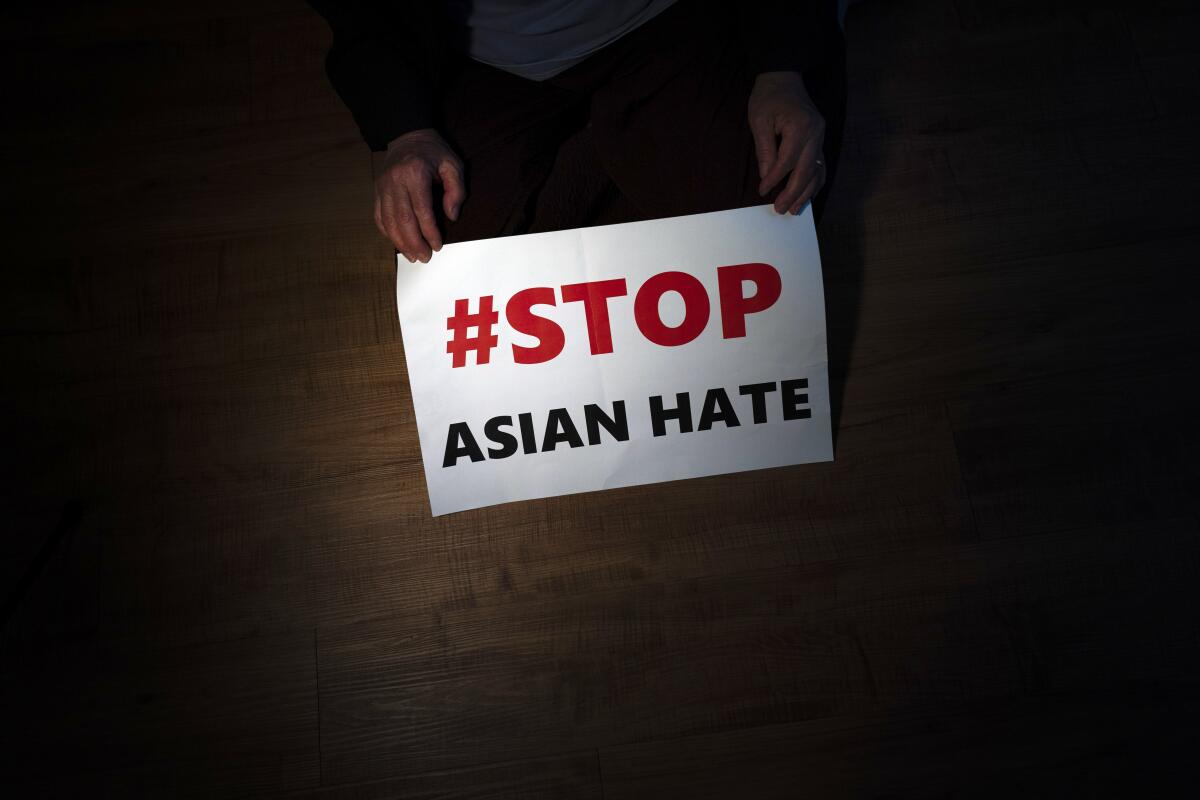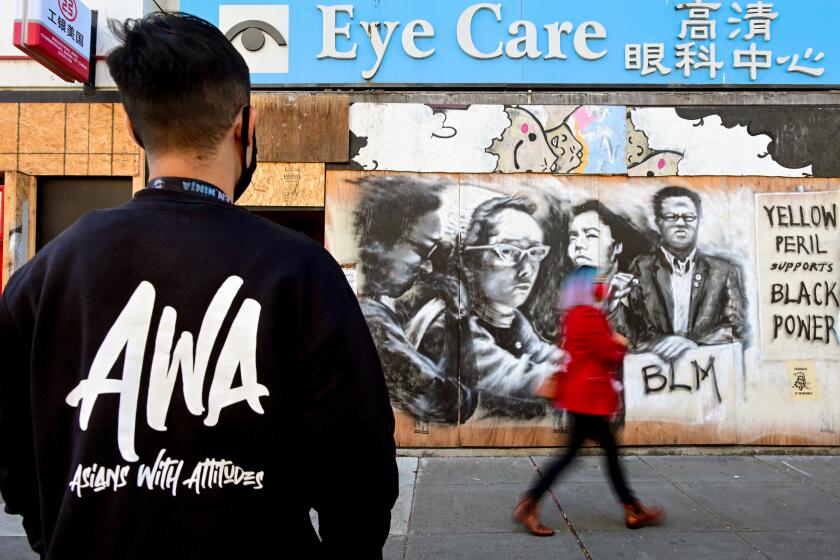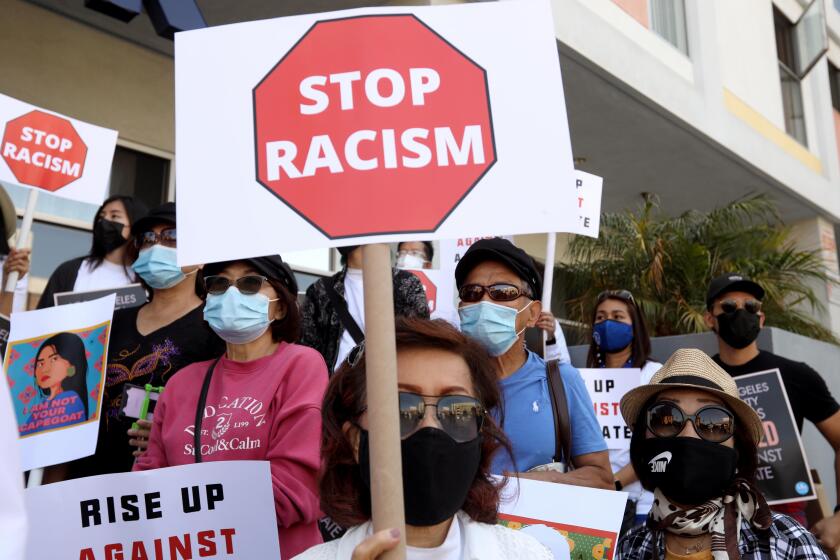Nearly a third of Asians in San Gabriel Valley report experiencing racism during the pandemic

- Share via
Nearly a third of Asian Americans in the San Gabriel Valley said they or their family members have experienced anti-Asian hate during the COVID-19 pandemic, with most incidents involving verbal attacks, a new survey found.
Nearly half of those surveyed said they feel less safe than before the pandemic, and the majority said they are more “vigilant and defensive” when they leave home, according to the survey released Wednesday by the Asian Youth Center and Asian Americans Advancing Justice-Los Angeles.
Of those who are parents, about half said they are concerned about their children being the victims of racist bullying or insults at school.
The San Gabriel Valley is home to more than half a million Asian Americans — one of the highest concentrations in the United States.
One survey respondent expressed dismay about anti-Asian racism in an area where many cities, including Arcadia, Monterey Park and San Gabriel, are majority Asian.
“There has been a noticeable shift in how people perceive APIs, and to experience racism in an area that’s predominantly API shows that we’re not really safe anywhere, even at home,” said the respondent, using an abbreviation for Asian Pacific Islander.
Another said: “I’ve definitely experienced racism growing up Asian American, but not to the point where I’m concerned about physical attacks. Previously it was more about discrimination in daily life/interactions, but not physical attacks.”
Former President Trump was among those who highlighted COVID-19’s origins in China, leading some to blame Asian Americans for the pandemic.
In Los Angeles County, anti-Asian hate crimes increased by 76% in 2020, mirroring a disturbing trend in many other jurisdictions.
Violent attacks against Asian American senior citizens around the country led to the formation of volunteer foot patrols, including in Oakland and the San Gabriel Valley.
Even before the Atlanta-area spa attacks that killed eight people, including six women of Asian descent, volunteer groups have sprung up to defend their Asian American communities in California.
“There’s a real concern and fear about all the hate exploding against our community. A study like this gives us insight and details — allowing us to come together to figure out what to offer to people to keep them safer,” said Connie Chung Joe, chief executive of Advancing Justice-LA, the nation’s largest legal and civil rights organization for Asian Americans, Native Hawaiians and Pacific Islanders.
Historically, “scapegoating is not new — but it still is very disturbing,” said Asian Youth Center Executive Director Michelle Freridge.
Both Joe and Freridge spoke at a virtual news conference Wednesday to announce the survey results.
While other social services groups have issued studies spotlighting anti-Asian hate, this is the first to focus on the San Gabriel Valley. Volunteers surveyed residents in English, Chinese or Vietnamese online and by phone.
More than half of respondents said they do not think there is support in their community for victims of racial harassment or discrimination.
Community patrols and neighborhood watches, followed by stronger relationships with police and more cross-cultural events, were the strategies respondents believed would be most effective in combating discrimination.
New report shows the breadth of anti-Asian racism, with attacks reported in hospitals, restaurants and schools
U.S. Rep. Judy Chu (D-Monterey Park), who co-founded the youth center in 1989, lauded the survey, saying that promoting racial harmony goes hand in hand with elevating awareness of Asian cultural contributions.
That’s part of the reason activists are pushing for a permanent AAPI Museum, along with infusing AAPI history into school curriculum, she said.
“We must boost allyship to make sure we support one another when any group is attacked,” Chu said.
L.A. County Supervisor Hilda Solis said she is working to expand community outreach through the L.A. vs. Hate program, run by the county’s Commission on Human Relations and focusing on strategies to empower residents to report hate and unite against it.
Robin Toma, the commission’s executive director, said the survey offers “significant” information that his group can use as guidance.
He hopes to open “Dream Resource Centers” in high schools — to create places where students can find comfort, rather than “have to swallow incidents and suffer with it,” he said.
Last June, California legislators passed a historic $166-million Asian Pacific Islander Equity Budget, with the money going to aiding victims as well as mental health and education programs aimed at tackling the root causes of anti-Asian racism.
At the press conference, Hanna Chang said she was recharging her electric car in South Pasadena last summer when a man, impatient with her progress, shouted: “F—ing chink!”
Chang was across the street from a police and fire station, in what she described as an “idyllic” community.
Racist abuse “can happen anywhere, and this was in the middle of the day, in front of a lot of people,” she said.
More to Read
Sign up for Essential California
The most important California stories and recommendations in your inbox every morning.
You may occasionally receive promotional content from the Los Angeles Times.












